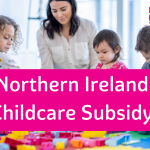Help with upfront childcare costs in Northern Ireland through the Advisor Discretion Fund
Parents in Northern Ireland who are receiving Universal Credit or other income-based benefits, can struggle to pay their initial childcare bill upfront when they are trying to move into work, return to work from parental leave, or increase their hours of work.
Registered childcare costs are often paid monthly in advance, usually at the start of the month. Many parents can struggle to afford this bill as it may have to be paid before they have received their wages, or sometimes even before they have started work.
The Universal Credit system requires a parent to first pay their registered childcare bill, and then have a portion of these costs reimbursed. This can take up to six weeks. By then, the parent will have had to make another payment to the childcare provider for the next month’s childcare bill, again paying these in advance before any financial support has been received.
This can mean that, for some parents, moving into work is simply not possible without going into debt or using savings. This barrier to employment has been recognised by the Northern Ireland Executive. Eligible parents can now claim help with their initial ‘upfront’ childcare costs in the form of a non-repayable grant through the Adviser Discretion Fund (ADF).
Adviser Discretion Fund for upfront childcare costs
Eligible parents who are in receipt of, or moving onto, Universal Credit, or another income based benefit, can apply for support through the ADF to cover initial upfront childcare costs that are a barrier to:
- starting work
- working more hours
- returning to work after maternity leave or other parental leave.
Key points:
- This is a non-repayable grant of up to £1,500 for upfront childcare costs
- The money is paid directly to a registered childcare provider
- A receipt for the payment can be submitted to Universal Credit for the calculation of further entitlement.
How to apply
Parents will need to complete two forms which are available from their work coach:
- ADF application form (AD1 form) and
- Assistance with Upfront Childcare Costs (AD5 form).
The Work Coach will discuss the application with the parent before providing the forms, but it is important to note that receiving or completing these forms is not a guarantee that an application will be successful. The childcare provider will also have to complete some sections of the AD5 form.
Once fully completed, the forms must be returned directly to the parent’s Jobs and Benefits Office. Staff in the Jobs and Benefits office will be able to advise the parent of the process and the local arrangements to deal with the application forms. We would encourage parents and childcare providers to complete and return these forms as quickly as possible, to avoid delays in assessment and payment.
A successful application will be confirmed by the Work Coach, or on receipt of a Confirmation of Payment form (AD7 form).
The maximum overall limit for the ADF is £1,500 in any 12 month period. However, a parent can make more than one application for example if they start a job which later ends, and then start a new job within the same 12 month period.
If the childcare provider usually charges on a weekly basis only one AD5 form should be completed with the childcare costs figure relating to the whole period, up to a maximum of one month, that help is being claimed for. The childcare provider will receive a single payment covering the whole month.
How a payment is made and how it affects Universal Credit
ADF payments are made directly to a childcare provider’s bank account by the Jobs and Benefits Office on behalf of the parent. Once payment is made, the Jobs and Benefits Office will provide the parent with a receipt (AD7 form) instead of proof of payment being given to the parent by the childcare provider.
If the parent is claiming Universal Credit, they can upload the AD7 form to their journal as proof of payment, as if they had made the payment themselves. The parent’s next Universal Credit award will be increased to include the reimbursement of 85% of registered childcare paid during the parent’s assessment period, including any costs that were paid by the ADF.
Summary: step by step guide for parents
- Request ADF support for childcare: Inform your work coach that upfront childcare costs are a barrier to moving into work or increasing your hours of work – provide evidence of the childcare that you require and the costs you have been quoted.
- Complete application forms: Complete forms AD1 and AD5 (provided by your work coach) and ask your childcare provider to complete the relevant information on the AD5 form. Return the AD5 form directly to the Jobs and Benefits Office.
- Childcare provider is paid enabling child to attend: Childcare provider will receive payment directly from the Jobs and Benefits Office enabling your child(ren) to take up their place.
- Upload your receipt to your UC journal (if applicable): You will receive a receipt (AD7) from the Jobs and Benefits Office. Upload this receipt to your UC journal as proof of your childcare costs, if you are a Universal Credit claimant.
If you are considering returning to employment and would like further advice on how this change may affect your entitlement to any benefits or help with childcare costs, or wish to find out more about what financial support you may be entitled to, contact our Family Benefits Advice Service for free, impartial and confidential advice. Call us on Freephone 0800 028 3008 or email hello@employersforchildcare.org – we are here to help.
Watch this video for more information
James Gallagher from Employers For Childcare's Family Benefits Advice Service outlines a recent change which means that some parents in Northern Ireland who are claiming Universal Credit or other income-based benefits and are moving into work or increasing their hours may be eligible to have their childcare costs paid upfront through the Advisor Discretion Fund.






